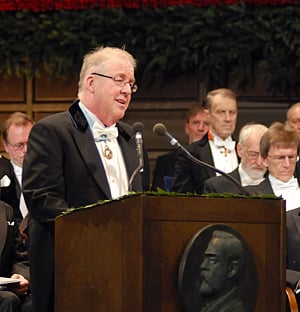Speech by Dr Marcus Storch, Chairman of the Board of the Nobel Foundation, 10 December 2008.
 |
| Dr Marcus Storch delivering the opening address during the Nobel Prize Award Ceremony at the Stockholm Concert Hall. Copyright © The Nobel Foundation 2008 Photo: Hans Mehlin |
Your Majesties, Your Royal Highnesses, Honoured Laureates, Ladies and Gentlemen,
On behalf of the Nobel Foundation, I would like to welcome you to this year’s Nobel Prize Award Ceremony. I would especially like to welcome the Laureates and their families to this ceremony, whose purpose is to honour the Laureates and their contributions to science and literature. We send our warmest regards to Professor Nambu, who was unable to come to Stockholm.
Earlier today in Oslo, Peace Prize Laureate Martti Ahtisaari was honoured “for his important efforts, on several continents and over more than three decades, to resolve international conflicts”.
According to the will of Alfred Nobel, the task of the Nobel Foundation – through the prize-awarding institutions – is to choose those in science and culture who have made the greatest contributions to human progress. Thus our task is not to predict the future, but to describe to the best of our ability what has happened.
This should not prevent us from describing the experiences we have gathered during the more than 100 years that the Nobel Foundation has existed.
The basis of all human development is knowledge. The most important contributions come from universities. It is therefore logical to try to describe how a university can best perform its task.
As I see it, a university has three main tasks:
1. To be the memory of society
2. To be the cutting edge of society and
3. To be the critical mirror of society.
Let me comment on these three tasks.
To be the memory of society implies passing on to the next generation what we know today.
In Alice in Wonderland, Lewis Carroll said: “It takes all the running you can do just to keep in the same place.” Our know-how – the base – is constantly growing, which implies that the requirements for passing on today’s knowledge are growing all the time. Not increasing the resources of universities in a way that keeps up with the base implies that we cannot fulfil this fundamental task. The consequence will be a stagnant society.
Today humanity is undoubtedly facing ever-increasing challenges, and cutting-edge research plays and will play an ever more important role globally. This implies being able to stimulate, refine and attract the researchers of today as well as the best students, and thereby the researchers of the future. But universities must also possess such breadth that studies can be pursued relatively freely between different disciplines. In their undergraduate education, many of our Laureates in scientific disciplines have also studied humanistic subjects. This cross-fertilisation has proved to be of great significance in achieving success. Meanwhile it presupposes a minimum size in order to be a successful university. The trend in many countries is to create a growing number of new universities and thereby spread our always limited resources, posing a risk that universities cannot perform their task.
Many experts maintain that there are two kinds of research – good research and bad research. There is a lot of truth to this. Another approach is to speak of basic and applied research. Roughly speaking, basic research operates without pre-determined objectives, whereas applied research operates with pre-determined objectives. Both are important and are prerequisites for each other. Major advances for the benefit of humanity most often come through basic research, which is illustrated – not least – by the list of previous and current Laureates. Applied research makes use of these advances. One of the founders of the well-known Lasker Award, Ms Mary Lasker, said, “If you think research is expensive, try disease.” Unfortunately, the trend today is that an ever-smaller share of our total resources is being allocated to basic research. Professor Gunnar Öquist, Permanent Secretary of the Royal Swedish Academy of Sciences, recently wrote: “Maintaining today that research policy should be steered towards the needs of the commercial sector shows that those who advocate such a development have not at all understood the challenges that humanity faces. It also shows a lack of knowledge about the potential that is inherent in a scientific research system.” Basic research is the single most important component that enables us to meet the challenges that humanity faces. Are we on the right path?
The third task is to be the critical mirror of society. During the 20th century, and especially after the horrors of the Second World War, the need arose to affirm fundamental human rights at an international level. And exactly today, we can celebrate the 60th anniversary of the proclamation by the United Nations of the Universal Declaration of Human Rights on December 10, 1948. Very few countries even today fulfil all 30 articles of the Declaration. Nevertheless, we can note that this document – whose main author René Cassin was awarded the Nobel Peace Prize 40 years ago – establishes an important standard, which can be used in order to combat injustices and oppression. One central element of human rights is the freedom to gather and exchange knowledge. A disturbing trend is that more and more restrictions on free speech, and thus on opportunities to perform the scrutinising task, can be seen in a growing number of contexts around the world. There is a serious risk that developments will move in what, for all of us, is the wrong direction.
I have pointed out the risks I see in our way of managing the major challenges that humanity faces. What is positive is that we ourselves will determine how we wish to act. Our choice of strategy will require both knowledge and audacity.
Copyright © The Nobel Foundation 2008